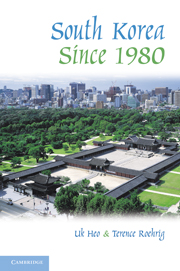Book contents
- Frontmatter
- Contents
- Dedication
- 1 Politics, Economics, and Foreign Relations before 1980
- 2 From Dictatorship to Democracy
- 3 Democratic Consolidation and Social Change
- 4 Economic Development and Financial Crisis
- 5 Economic Reform and the Korea–U.S. Free Trade Agreement
- 6 Inter-Korean Relations and the North Korean Nuclear Crisis
- 7 The South Korea–U.S. Alliance
- 8 South Korea and the Regional Powers
- Selected Bibliography
- Index
- References
4 - Economic Development and Financial Crisis
Published online by Cambridge University Press: 05 June 2012
- Frontmatter
- Contents
- Dedication
- 1 Politics, Economics, and Foreign Relations before 1980
- 2 From Dictatorship to Democracy
- 3 Democratic Consolidation and Social Change
- 4 Economic Development and Financial Crisis
- 5 Economic Reform and the Korea–U.S. Free Trade Agreement
- 6 Inter-Korean Relations and the North Korean Nuclear Crisis
- 7 The South Korea–U.S. Alliance
- 8 South Korea and the Regional Powers
- Selected Bibliography
- Index
- References
Summary
The story of economic development in South Korea is phenomenal. Shortly after the country was liberated from Japanese colonial rule in 1945, South Korea was demolished during the Korean War, which began in 1950. The three-year war completely devastated the small country and destroyed most of its industries. As a result, South Korea was one of the poorest countries in the world in the 1950s, and its economy was largely dependent on U.S. economic aid. In the 1960s, the economy began to change. With a government-led development strategy begun under Park Chung-hee, South Korea launched an economic development plan that promoted industrialization and increased exports and grew the economy at a rapid pace. For instance, South Korea's per-capita gross national income (GNI) in 1960 was a mere $76 but by 2007 increased to $20,045. Today, South Korea's Gross Domestic Product (GDP) is the thirteenth largest in the world at $970 billion, and it ranks twelfth in the world in total trade at $728 billion. In fewer than five decades, the war-torn economy became a global economic powerhouse.
South Korea's economic success was driven by a government-led development paradigm, which is based on top-down economic directives and regulations from the government rather than a liberal market system. Using depoliticized institutions to intervene in private business under a slogan calling for economic development, authoritarian governments regularly acted to upgrade the country's industrial infrastructure and improve international competitiveness.
- Type
- Chapter
- Information
- South Korea since 1980 , pp. 78 - 103Publisher: Cambridge University PressPrint publication year: 2010



